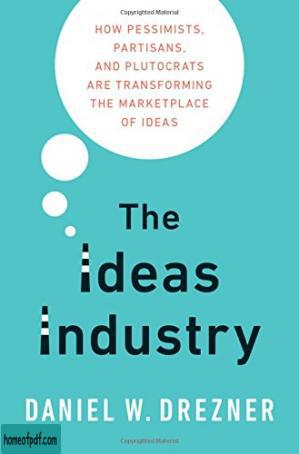The Ideas Industry: How Pessimists, Partisans, and Plutocrats are Transforming the Marketplace of Ideas 电子书下载
书名:The Ideas Industry: How Pessimists, Partisans, and Plutocrats are Transforming the Marketplace of Ideas
The public intellectual, as a person and ideal, has a long and storied history. Writing in venues like the New Republic and Commentary, such intellectuals were always expected to opine on a broad array of topics, from foreign policy to literature to economics. Yet in recent years a new kind of thinker has supplanted that archetype: the thought leader. Equipped with one big idea, thought leaders focus their energies on TED talks rather than highbrow periodicals. How did this shift happen? In The Ideas Industry, Daniel W. Drezner points to the roles of political polarization, heightened inequality, and eroding trust in authority as ushering in the change. In contrast to public intellectuals, thought leaders gain fame as single-idea merchants. Their ideas are often laudable and highly ambitious: ending global poverty by 2025, for example. But instead of a class composed of university professors and freelance intellectuals debating in highbrow magazines, thought leaders often work through institutions that are closed to the public. They are more immune to criticism--and in this century, the criticism of public intellectuals also counts for less.Three equally important factors that have reshaped the world of ideas have been waning trust in expertise, increasing political polarization and plutocracy. The erosion of trust has lowered the barriers to entry in the marketplace of ideas. Thought leaders don`t need doctorates or fellowships to advance their arguments. Polarization is hardly a new phenomenon in the world of ideas, but in contrast to their predecessors, today`s intellectuals are more likely to enjoy the support of ideologically friendly private funders and be housed in ideologically-driven think tanks. Increasing inequality as a key driver of this shift: more than ever before, contemporary plutocrats fund intellectuals and idea factories that generate arguments that align with their own. But, while there are certainly some downsides to the contemporary ideas industry, Drezner argues that it is very good at broadcasting ideas widely and reaching large audiences of people hungry for new thinking. Both fair-minded and trenchant, The Ideas Industry will reshape our understanding of contemporary public intellectual life in America and the West.
尊敬的读者:
欢迎您访问我们的网站。本站的初衷是为大家提供一个共享学习资料、交换知识的平台。每位用户都可以将文件上传至网盘并分享。
然而,随着用户上传的资料增多,我们发现部分不宜或版权问题的书籍被分享到了本站。
为此,我们已经关闭了分享入口,并进行了多次书籍审查,但仍有部分内容未能彻底审查到位。
在此,我们恳请广大读者与我们共同监督,如发现任何不宜内容,请 点击此处 进行举报,我们会第一时间处理并下架相关内容。
希望我们能共建一个文明社区!感谢您的理解与支持!
猜你喜欢
- 《基业长青》吉姆·柯林斯珍藏版 电子书下载
- 《理解公司:产权、激励与治理》张维迎修订版 电子书下载
- 《我们掩埋的人生》艾伦·艾丝肯斯中文修订版 电子书下载
- 《唐人故事》王小波 电子书下载
- 《披着羊皮的狼:如何与控制型人格相处》乔治.K.西蒙文字版 电子书下载
- 《亲爱的丫头》柯继铭修订版 电子书下载
- 《Photoshop Lightroom摄影师专业技法》Soctt kelby扫描版 电子书下载
- 《阴谋简史》米克·韦斯特 电子书下载
- 《哈佛商学院最受欢迎的领导课》罗伯特·史蒂夫·卡普兰中文版 电子书下载
- 《有话说》崔永元 文字版 电子书下载
- 《乌合之众:大众心理研究》(法语直译未删减版,独家收录《论自愿为奴》) (译林人文精选)古斯塔夫·勒庞文字版 电子书下载
- 《卡罗尔》帕特里夏·海史密斯 电子书下载












